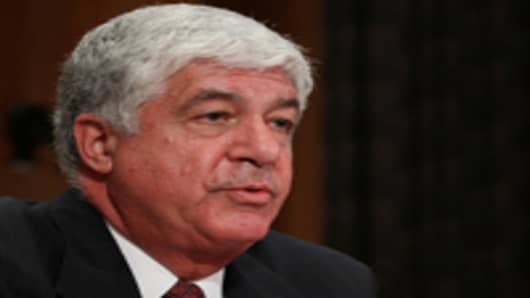The Federal Reserve's decision to turn down AIG's $15.7 billion offer to buy back a swath of mortgage backed securities could result in a loss for US taxpayers from the AIG bailout, CEO Bob Benmosche told CNBC.
Earlier Wednesday, the New York Fed refused AIG's offer to repurchase 800 residential mortgage backed securities, which were held in a special purpose vehicle called Maiden Lane II.
The Fed will now sell the securities in a competitive process over a yet to be disclosed period of time.
The news is a blow to AIG, which was hoping to bring these high yielding assets back on its books to be held against it long term insurance liabilities, something that Benmosche said would have enhanced the company's value to potential investors ahead of a re-IPO of the Treasury's 92 percent stake in AIG .
"We will be looking at other investing strategies," he told CNBC, warning those investments are likely to be lower-yielding and could put pressure on the company's stock.
Maiden Lane II was set up in 2008 to take these assets off AIG's books. At the time the insurance giant was near failure. The Federal Reserve bought the securities at a steep discount to their face value.
While lower grade, the securities have performed well since Maiden Lane II was established, paying interest and paying down equity on the mortgages. AIG maintains its offer would have netted the Fed a $1.5b profit on the investment.
But with investors appetite for risk returning, Wall Street firms that have polled their clients said there is a great deal of interest from hedge funds and other money managers for these securities. While it raises the possibility the Fed could receive strong bids for some of the assets, Benmosche wonders if the Fed will find buyers for all of them.
"There is a concern about its ability to sell some of the riskier assets, " Benmosche said, pointing out it may be left holding the worst of the bunch. AIG had offered to buy them all.
"We will participate," Benmosche said, when asked if the company would bid for some of the assets. Though AIG's participation will depend on the timing.
"We are losing money every day," he said, noting the firm has to do something with the $20 billion dollars in cash it has on hand within the next 30 to 60 days.
"We estimated the government would realize a profit of ten billion dollars," said Benmosche, a good deal of that estimated profit coming from the gains the Treasury would realize selling its AIG shares. Now, without Maiden Lane II's assets to back up its insurance liabilities, Benmosche says investors may not view the company as favourably, meaning it may break even and or lose money, once the stock is sold and the final figures are tallied.
AIG was rescued by the government through a series of bailouts during the financial crisis. All told, government assistance in loans, guarantees and other investments totalled $182 billion.



